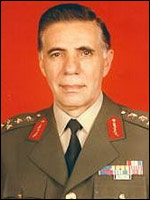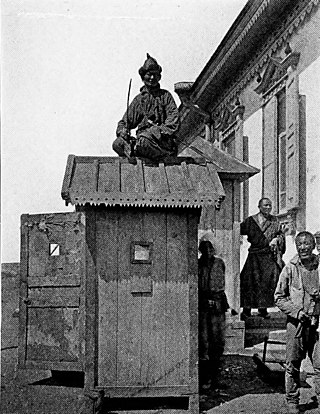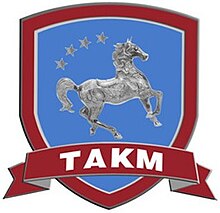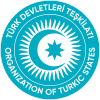
Law enforcement is the activity of some members of government who act in an organized manner to enforce the law by discovering, investigating, deterring, rehabilitating, or punishing people who violate the rules and norms governing that society. The term encompasses police, Courts and corrections. These three components of the criminal Justice system may operate independently of each other or collectively through the use of record sharing and cooperation. Throughout the world, law enforcement are also associated with protecting the public, life, property, and keeping the peace in society.

The Turkish Armed Forces are the military forces of the Republic of Turkey. The Turkish Armed Forces consist of the Land Forces, the Naval Forces and the Air Forces. The Chief of the General Staff is the Commander of the Armed Forces. In wartime, the Chief of the General Staff acts as the Commander-in-Chief on behalf of the President, who represents the Supreme Military Command of the TAF on behalf of the Grand National Assembly of Turkey. Coordinating the military relations of the TAF with other NATO member states and friendly states is the responsibility of the General Staff.

A paramilitary is a military that is not part of a country's official or legitimate armed forces. The Oxford English Dictionary traces the use of the term "paramilitary" as far back as 1934.

Military police (MP) are law enforcement agencies connected with, or part of, the military of a state. In wartime operations, the military police may support the main fighting force with force protection, convoy security, screening, rear reconnaissance, logistic traffic management, counterinsurgency, and detainee handling.

A gendarmerie is a military force with law enforcement duties among the civilian population. The term gendarme is derived from the medieval French expression gens d'armes, which translates to "men-at-arms". In France and some Francophone nations, the gendarmerie is a branch of the armed forces that is responsible for internal security in parts of the territory, with additional duties as military police for the armed forces. It was introduced to several other Western European countries during the Napoleonic conquests. In the mid-twentieth century, a number of former French mandates and colonial possessions adopted a gendarmerie after independence.
Jandarma İstihbarat ve Terörle Mücadele or Jandarma İstihbarat Teşkilatı is the intelligence department of the Turkish Gendarmerie. JİTEM was active in the Kurdish–Turkish conflict. After the Susurluk scandal, former prime ministers Bülent Ecevit and Mesut Yılmaz have confirmed the existence of JİTEM.

Human rights in Turkey are protected by a variety of international law treaties, which take precedence over domestic legislation, according to Article 90 of the 1982 Constitution. The International Covenant on Civil and Political Rights (ICCPR) was not signed by Turkey until 2000. As of today, however, Turkey is party to 16 out of 18 international human rights treaties of the United Nations. The issue of human rights is of high importance for the negotiations with the European Union (EU).

The Gendarmerie General Command is the national gendarmerie force of the Republic of Turkey. It is a service branch of the Turkish Ministry of Interior responsible for the maintenance of the public order in areas that fall outside the jurisdiction of police forces, as well as assuring internal security along with carrying out other specific duties assigned to it by certain laws and regulations. In wartime, some of its elements can be subordinated to Turkish Land Forces by the President of Turkey.

The judicial system of Turkey is defined by Articles 138 to 160 of the Constitution of Turkey.

The Law Enforcement Command of the Islamic Republic of Iran, previously known as the Law Enforcement Force of the Islamic Republic of Iran or Disciplinary Force of the Islamic Republic of Iran, abbreviated as Faraja, is the uniformed police force in Iran. The force was created in early 1992 by merging the Shahrbani, Gendarmerie, and Islamic Revolutionary Committees into a single force.

Law enforcement in Turkey is carried out by several departments and agencies, all acting under the Ministry of Internal Affairs except military police which is under the command of the Turkish Armed Forces and the National Intelligence Organization which directly reports to the president.

Provosts are military police (MP) whose duties are policing solely within the armed forces of a country, as opposed to gendarmerie duties in the civilian population. However, many countries use their gendarmerie for provost duties.

Law enforcement in San Marino is the responsibility of the centralized Civil Police, the Corps of Gendarmerie of San Marino, and the Fortress Guard.

Eşref Bitlis was a general in the Turkish Gendarmerie, who died in a controversial plane crash.
Süleyman Sabri Yirmibeşoğlu was a Turkish general. He was Secretary-General of the National Security Council from 1988 to 1990.

Süleyman Askerî Bey, also known as Suleyman Askeri, Sulayman Askari, Sulaiman al-Askari and unofficially known as Suleyman Askeri Pasha, was a military officer who served in the Ottoman Army. Askerî was of Circassian descent and co founder of the Teşkilât-ı Mahsusa, a group involved in guerilla warfare.

The Governor of Ankara is the bureaucratic state official responsible for both national government and state affairs in the Province of Ankara. Similar to the Governors of the 80 other Provinces of Turkey, the Governor of Ankara is appointed by the Government of Turkey and is responsible for the implementation of government legislation within Ankara. The Governor is also the most senior commander of both the Ankara provincial police force and the Ankara Gendarmerie.

Law enforcement in Syria is carried out by the Public Security Police, which is a force for general policing duties; internal security duties are carried out by different intelligence agencies. The Political Security Directorate is one of these agencies and is under the guidance of the Ministry of Interior of the Syrian government. The Directorate is used for covert intelligence gathering and internal security issues within Syria. Syria has been an INTERPOL member since 1953. Since the outbreak of the Syrian Civil War, much of Syria has been outside the control of the Syrian government. Currently, the Asayish are responsible for policing in the Autonomous Administration of North and East Syria, the Turkish-backed Free Syrian Police in areas under the Turkish occupation of northern Syria, and various Syrian opposition groups around Idlib

The Ministry of Justice and Home Affairs is the sole organ of national security in Mongolia. The primary force is responsible for maintaining law and order and preventing crime throughout the country is the National Police Agency, created in 1965 and headquartered in the capital Ulaanbaatar. Interpol has an office within the Mongolian Police.



















